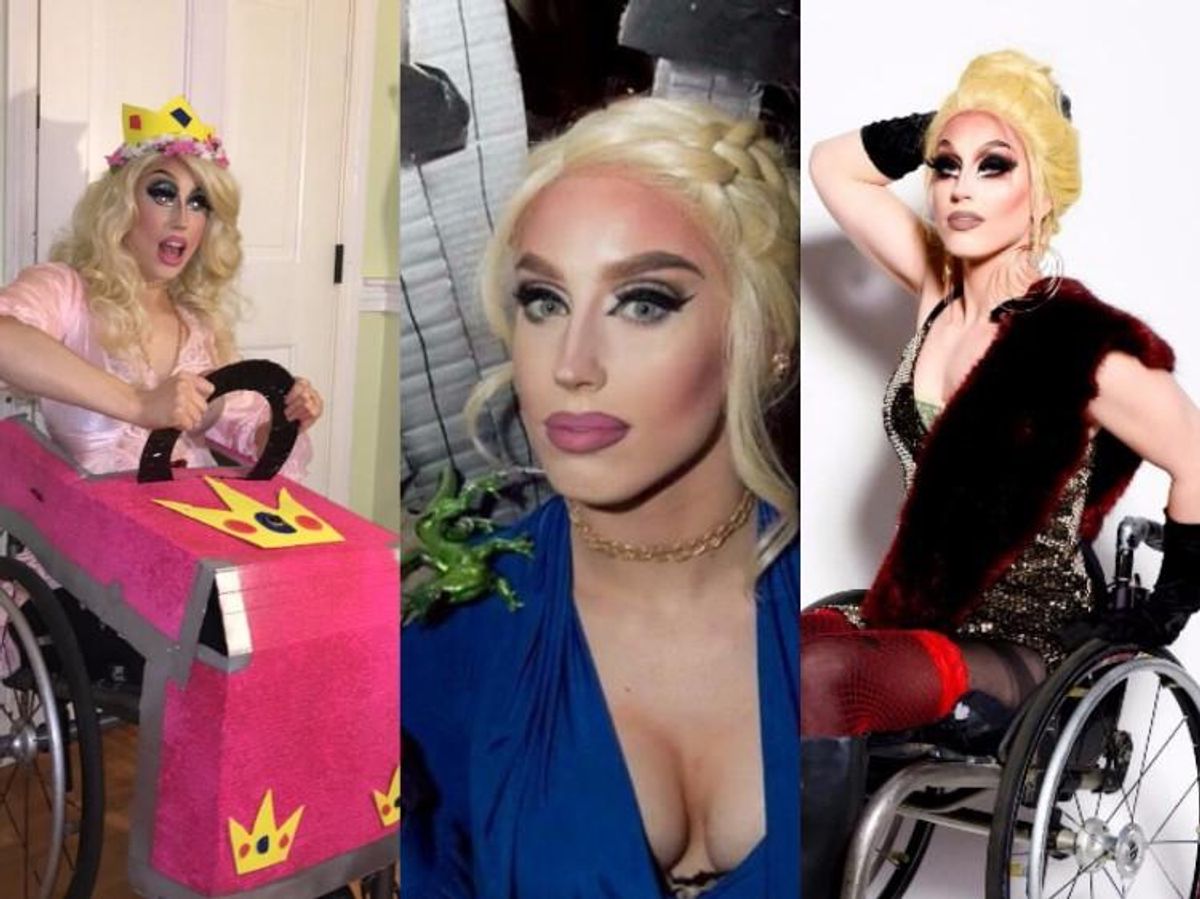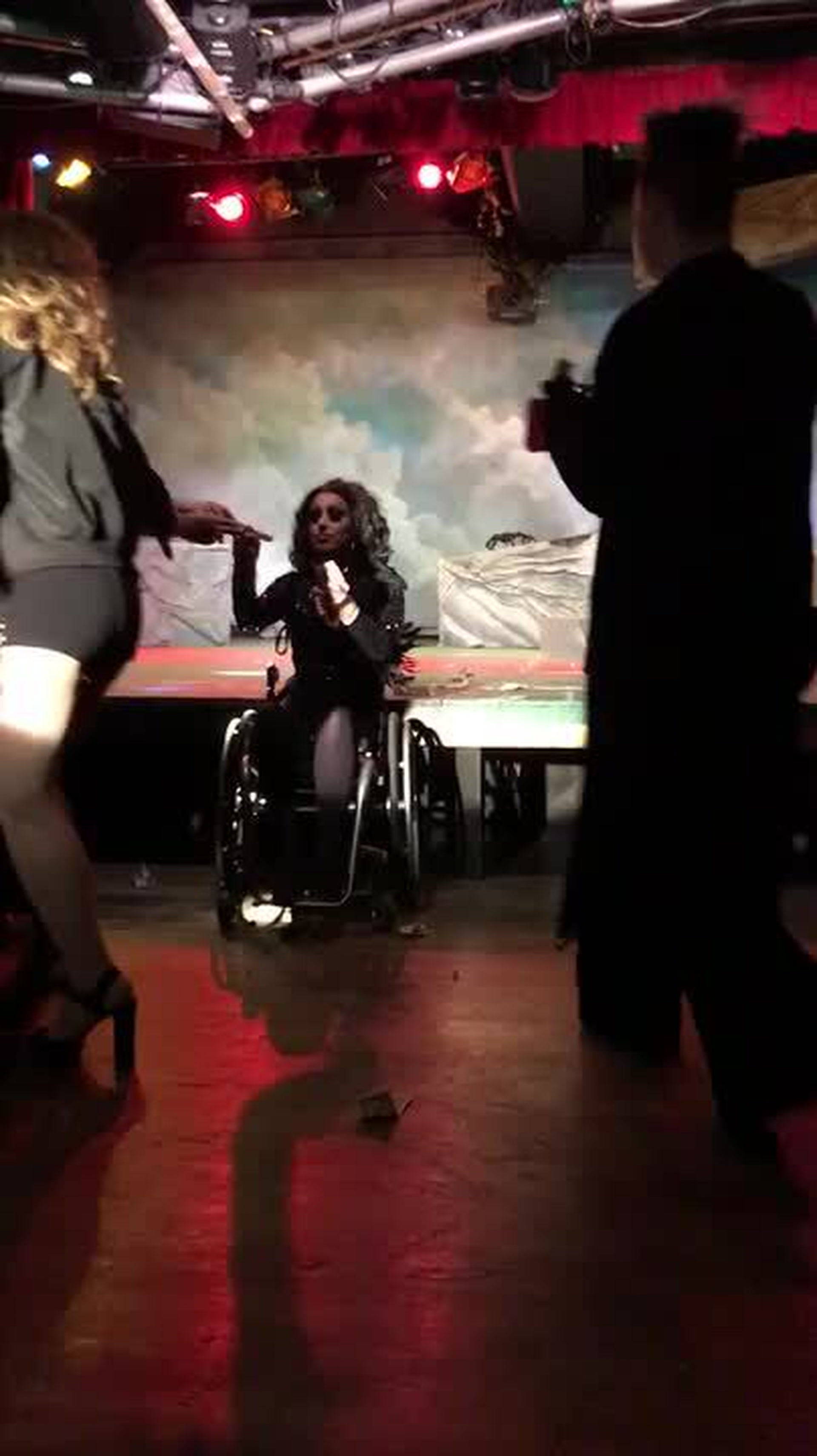Interviews
No, the Wheelchair Is Not a Prop: Sarah Palegic, Not Your Ordinary Drag Queen

“I just want to dress up, do make up, and be able to be part of the queer community.”
May 08 2017 2:35 PM EST
May 31 2023 6:32 PM EST
By continuing to use our site, you agree to our Private Policy and Terms of Use.

“I just want to dress up, do make up, and be able to be part of the queer community.”
"I get a lot of, 'You're inspirational.' 'You're amazing.' 'You're brave.' I find it odd," New England lady queen Sarah Palegic recently told OUT. "Why am I amazing? You don't know me and I don't like you. Just the fact that I am there, in front of them, existing without crying, that's 'amazing.' It's like they're saying, 'If I was in your shoes, my life would be so awful.' It's kind of an insult."
While Sarah Palegic might not like you calling her inspirational, there's still no question that she isn't your ordinary drag queen. She is indeed paraplegic (no, her wheelchair is not a prop--stop asking her) and a cisgender woman. Of course, drag is a notoriously gay male and able-bodied profession. Yet she has not only excelled, constantly being asked to perform, but has become a matriarch in both the Boston and Providence drag communities.
"You taught CiCi makeup, and CiCi taught me," a local queen told Sarah the night of her performance at Machine, one of Boston's largest drag venues. "So you're like my drag grandma."
Even though she is a woman, the local New England drag communities have been welcoming. Part of this was because Sarah wasn't pushy. She didn't go around asking for gigs. In fact, she had no intention of performing; she simply enjoyed going out in full face. But when a queen at the Dark Lady in Providence asked her to perform, she agreed. In honor of Sarah's first performance, they created a "Queens on Wheels" night. One queen was on roller skates and another was on a scooter.
"They went completely over-the-top to make me feel welcomed, and it was incredible."
The heartfelt welcome she received from queens in Providence was polar opposite to the feedback she received online two years ago, when she first started doing drag and joined multiple drag queen Facebook groups.
"Like every woman, I've experienced misogyny my whole life, but this was the first time, point blank, I was told I cannot do something because I am a woman. Or more specifically, because I don't have a penis."
Photography: Corey Banda
At the same time, she understands why as a cisgender woman, being a drag queen is a different experience. "I'm happy with the term lady queen," she explains. "I used to say bio-queen, but the community is moving further away from that because it's trans-exclusionary. If you don't want to call me a drag queen that's fine. Call me whatever. I just want to dress up, do make up, and be able to be part of the queer community."
And as a pansexual, queer woman, she deserves to be in that space as much as any other member of the LGBTQ community.
Six years ago, when she was 19, Sarah was in a car accident, leaving her permanently paralyzed. After being injured, she worried if her friends would stick around to support her, and if anyone would ever want to date her. She thought she'd be too big of a burden.
Luckily, while still in the hospital, a friend who claimed he had always been madly in love with her, professed his emotions. Feeling insecure and needing the validation, Sarah reluctantly agreed to date him. Within a couple months of dating, he broke up with her, saying, "It's definitely not what I thought it would be. It's a lot harder dating someone like you than I thought."
Photography: Jess Razzi
This confirmed every single worry she'd had about finding meaningful connections: All the folks she liked ended up leaving her because she was simply too big of a burden. "To this day, his words have stayed with me."
But she gets more attention now than she did as an able-bodied person. "It's validating, but equally invalidating. I don't know if people are genuine. So many people are into it. I think they like the novelty. They find me interesting. Or it makes them feel good about themselves for giving attention to this poor girl in a wheelchair."
Then there's the whole group of guys who have very serious disability fetishes. Sarah's been catfished on repeated occasion. When she came out of the hospital, she used Facebook to find other support groups. She'd talk to profiles of other women in wheelchairs, thinking she was making a friend, only to receive questions like, "Can you send me a picture of your legs? I want to see if yours and mine look the same."
Photography: Corey Banda
Sarah says she's received hundreds upon hundreds of messages from men pretending to be disabled girls. Somehow, it doesn't wear her down. It just makes her appreciate her friends even more.
Her friends and current partner are the ones who support her when she's feeling like a burden. "Dating someone with a disability really limits spontaneity," Sarah says. "You have to plan things. Is there a ramp? How wide is the bathroom door? The planning is a real pain in the ass."
But when she tells her partner or friends that she doesn't have to go out--that they should just have fun without her--they have none of it. They say, "Seriously, shut up. You're coming."
"They don't care," she adds, "And I really need that."
As someone who goes out and performs, it's necessary to have that affirmation from close friends and partners. It's necessary to feel human when so many strangers in the club dehumanize her. They say, "You're too pretty to be in wheel chair," or they'll hit her leg and when she moves, they'll claim she's faking it. At which point, she'll have to reply that her wheelchair moved, and she can feel that. Or they'll immediately ask a question about how sex works for her, and if she has feeling "down there."
Still, most people aren't that rude. Most just want to know her "deal."
"I don't think it's malicious," she says, "But it has a negative impact. It's clear they don't want to know the real me, just my story. It's frustrating. I don't want to talk about my car accident every time I'm at the club, multiple times a night. I'm just trying to get drunk, ya know?"
This is where her drag persona comes into play, intersecting her disabled and female identity.
"In drag, I can be sassy. It's expected for me to be sassy as a queen. I'm allowed to say I don't wanna talk about it right now. I have no problem doing that in drag. But when I'm my girl self, I'm less bold. Less likely to be like 'fuck you, get the fuck away from me.'"
Being in drag allows Sarah to be unabashedly herself, to not put up with shit, to temporarily forget some of the struggles that come with being paraplegic. For her, drag is so much more than putting on the heels, wigs, and makeup.
"Drag is therapy."
Check out Sarah Palegic in action, below:
